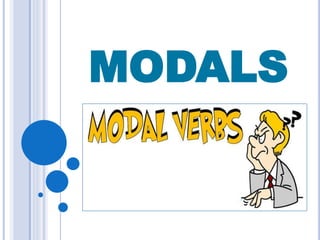
Modals
- 1. MODALS
- 2. AUXILIARY VERBS/ HELPING VERBS They help to form tense, voices and moods of the main verbs. Auxiliary are twelve in number. Helping/ Auxiliary Verb Primary Auxiliary Modals Auxiliary
- 3. MODAL AUXILIARIES- Modals help to express the mood or attitude of the speaker. Modals are followed by a main verb. The Main verb is always in the root form. Modals always have the same form. They do change according to the number and person of the subject.
- 4. WE CAN EXPRESS SUCH CONCEPTION OF MIND AS- 1. Permission may, can, could 2. Possibility may, might 3. Ability can, could 4. Suggestion, advice, must, should, ought to duty, obligation 5. Promise, intention will, shall 6. Necessity, compulsion must, have to, need 7. Wish may 8. Done accustomed used to 9. Prohibition ought not to, must not 10. Challenge, courage dare
- 7. Use of Shall Shall is used in the First Person to denote simple future tense. Shall is used in the Second Person and Third Person to express: A promise- You shall be paid tomorrow. A command- He shall go there. A threat- The officer shall be punished. Determination- They shall obey us, whether they like it or not. Shall
- 8. Use of Will Will is used with Second Person and Third Person to express simple future tense. Will is used in the First Person to express: Willingness- I will lend you my book. A promise- We will help you. Determination- I will fight for my rights. A threat- We will expose him’ Intention- I will call her today. (I intend to call her) Will
- 9. IN ASKING QUESTIONS, FOLLOWING RULES SHOULD BE OBSERVED- First Person- We always use ‘Shall’. Never say ‘Will I?’ or ‘Will we?’ Shall I call her? Second Person- ‘Shall’ or ‘Will’ is used accordingly. Shall you go home? ‘Will’ is for asking a favour. Will you come tomorrow? Third Person- ‘Will’ is used always. Will he go there? Will they come to see us today?
- 10. Use of Should (Past of Shall) It is used to express: Duty or obligation- We should help the poor. Duty in the past- You should have done the work. Advice- You shouldn’t make fun of the disabled. Disapproval- You shouldn’t have behaved in this manner. After ‘lest’ to express negative purpose- He ran fast lest he should miss the train. Should
- 11. Use of Would (Past of Will) It is used to express: A wish- I would like to see that book. Determination- He would not lie. Willingness in the past- She said that she would help me. In polite speech- Would you please lend me your book? Past habit- After lunch he would generally take a nap. Condition or uncertainty- I would go there, if I were asked. Would
- 12. Use of Can and Could Requests- Can is less polite. Could is more polite. Can you open this jar? (informal way). Could you do me favour? Ability- Can shows present and Could shows past ability. I can dance, I could dance when I was young.
- 13. Permission- Can is used for informal permission. Could is used for formal permission. Can I use your pen? Could you give me your notebook? Possibility- Can shows present possibility. Could shows past possibility. They can come by car. They could the work on their own. Use of Be able to General ability- Present/ Past/ Future- is, am, are/ was, were/ shall, will
- 14. Use of May and Might They are used as Principal verb to denote: Permission- May I go? Yes, you may. Wish- May God bless you! Possibility in Present or Future- It may rain tonight. She might go to the mall tomorrow. May Might
- 15. Doubt or uncertainty- May is used when there are more chances of possibility. Might is used when there are less chances of possibility. He may not have spoken the truth. He might be late. Negative or Interrogative- When may we expect you? He might not come. Purpose- He works hard so that he may become rich. The brave man died so that we might live.
- 16. Use of Must Necessity- We must exercise every day to keep fit. Determination- I must win this match. Duty- Everyone must do his duty. Certainty- Your father must have been very strong. Must
- 17. Use of Ought to It is used to express moral obligation, duties and desirability. It can indicate Present or Future Time It is always followed by infinitive. We ought to work hard. The ought to have worked hard. Why are you doing nothing? You ought to be working. You ought to have helped her. Ought to
- 18. Use of Need As a modal need is mostly used in Negative and Interrogative. In the Affirmative, it stands as required or in need of. I need to work hard. Do you need to work hard? It needs to be done with great care. They didn’t need to hurry. You needn’t go now, the work has been completed. Need
- 19. Use of Used to Used to is the Past Tense of a verb which has no Present Tense. I used to smoke, now I don’t. It can also be an adjective meaning accustomed. I am used to working in a noisy room. Used to
- 20. Use of Dare Challenge or Courage – He can not dare to defy you. Will she dare to jump out of the window? They dared not to say such things again. Did he dare to criticise his boss? How dare you hit my brother? How dare you speak so loudly in the class? Dare
- 21. Presented By- Ms Swati Hasija
